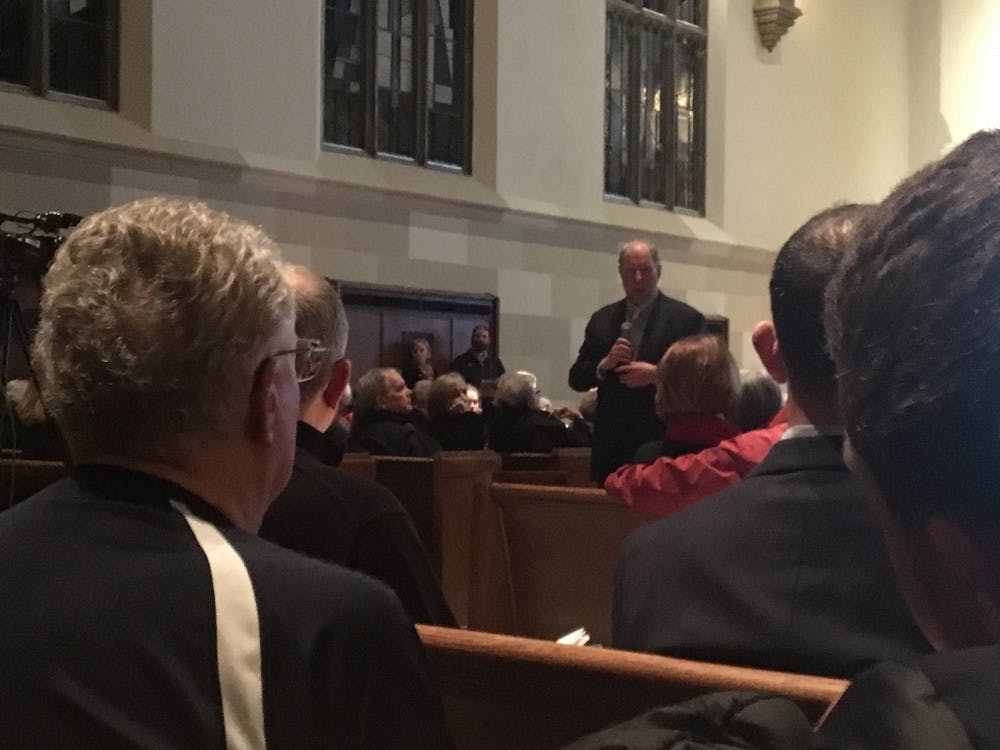Parental income now contributes more to the likelihood of earning a college degree than skill and intelligence does, government consultant and author Robert D. Putnam said at the Jepson Leadership Forum on Monday.
Putnam, a consultant to the last three American Presidents and last three British Prime Ministers, discussed his book, “Our Kids: The American Dream in Crisis,” and addressed widening class divides as well as college education disparities in the United States during the discussion.
“Your parents’ income matters more than what you can do,” Putnam said. “And that is the exact opposite of what the American Dream is.”
Putnam blamed America’s growing opportunity gap on burgeoning class segregation and the lack of social bonds in working-class communities. Pediatric development, parental investments in children, social trust and extracurricular activities have decreased among working-class families in the last 30 years, he said.
Putnam explained that the inability of children from the middle class to become as successful as wealthier children results from American society’s weakened sense of community.
“The sense that other’s kids aren’t our responsibilities is the problem,” he said.
Sophomore Lina Tori Jan said she found it unsettling that access to education was difficult for the lower class in the U.S.
“I think, coming from a country like Afghanistan, growing up there you have to fight for the right to education,” Jan said. “While in the United States it is not that way, but there are problems that cause many families to not be able to finish high school, attend college.”
Putnam used stories from his hometown of Port Clinton, Ohio, to demonstrate the expansion of class gaps in towns throughout America since the 1970s. He compared his own granddaughter, Miriam, a successful college graduate, to Mary Sue, the granddaughter of one of his friends. Mary Sue dropped out of high school and gave birth at 13 years old.
Putnam said that the difference between Miriam and Mary Sue was that Miriam’s family had attended college, while Mary Sue’s had not. Mary Sue, like many children, had made mistakes, but did not have the same safety nets or access to education that Miriam had. The wealth and education of their families would not have had as strong of an impact on their future 30 years ago, he said.
“This is about America,” Putnam said. “There are Mary Sues and Miriams everywhere in America, and there are more to come.”
Theresa Brooks of Henrico, Virginia, said that, as a former foster child, she was worried about the future of children from lower economic backgrounds.
Enjoy what you're reading?
Signup for our newsletter
“How they’re not even looking at your ability, but the economics of your parents, that really disturbed me greatly,” she said. “I did not realize that that’s the driving force to our future, because we have so many talented young people who will not have the opportunity to show it.”
The forum was moved to the Cannon Memorial Chapel in order to accommodate high demand for Putnam’s discussion; the majority of the 750 seats in the Chapel were filled.
Putnam has written 14 books, including “Bowling Alone,” one of the most cited books of the humanities in the last half century, according to his website.
Putnam said that the class gap is something Americans can fix by feeling a responsibility toward and investing in children from their communities.
Contact news writer Alexis Angelus at alexis.angelus@richmond.edu.
Support independent student media
You can make a tax-deductible donation by clicking the button below, which takes you to our secure PayPal account. The page is set up to receive contributions in whatever amount you designate. We look forward to using the money we raise to further our mission of providing honest and accurate information to students, faculty, staff, alumni and others in the general public.
Donate Now



